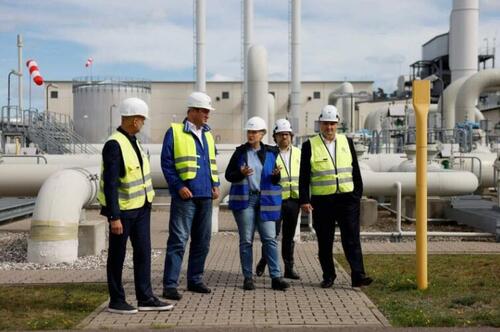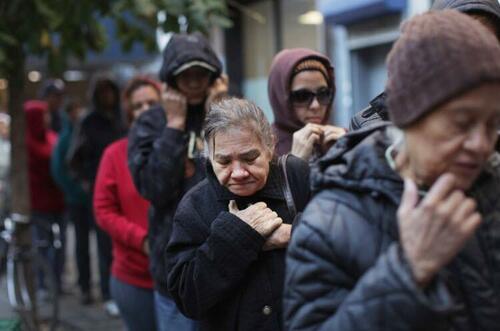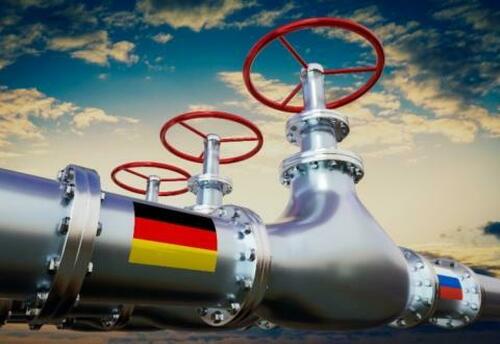Results 1 to 3 of 3
Thread Information
Users Browsing this Thread
There are currently 1 users browsing this thread. (0 members and 1 guests)
-
09-20-2022, 12:02 PM #1
Europe's Economy And Living Standards Are Plummeting
Europe's Economy And Living Standards Are Plummeting
TUESDAY, SEP 20, 2022 - 05:00 AM
Via Oriental Review,
The ill-considered sanctions against Russia have exposed the most acute problems of Europe which is rapidly losing its economic power. A tremendous amount of businesses are on the verge of bankruptcy. A flood of migrants from Africa, the Middle East and Ukraine requires more and more budget spending. Funds are also being used to support the Kiev regime. As a result, Europe’s economies are deteriorating and living standards are plummeting.
Enterprises are on the verge of closing
In Britain 60% of enterprises are on the verge of closing due to higher electricity prices. This is reported by the analytical group Make UK, representing the interests of British industry. 13% of British factories have reduced working hours and 7% are temporarily closing down. Electricity bills have risen by more than 100% compared to last year.
In Germany, according to the Leibniz Institute for Economic Research, the number of firms and individuals went bankrupt in August alone rose 26% compared to the same period last year. The figure was significantly higher than German analysts had forecast. According to experts, during the autumn the number of bankruptcies will only increase. This is connected with the increase of the cost of production processes, in particular with the rise in prices for energy.
German Chancellor Olaf Scholz acknowledged that many Germans have faced with rising prices for fuel and food. Most countries in Europe were in a similar situation. But the authorities are sacrificing the quality of people’s lives in order to continue to exert pressure on Russia.
The crisis is just ahead
At the same time, many experts believe the stopping of Nord Stream will cause Europe’s worst energy crisis in decades.

Manuela Schwesig, state premier of Mecklenburg-Vorpommern, and Markus Söder, state premier of Bavaria, visit a site that will feed an existing pipeline network with liquefied natural gas in Lubmin, Germany, on August 30, 2022
This circumstance has already caused a sharp rise of prices of energy resources on the European market. As a result, energy bills of European households have increased. According to Goldman Sachs’ analysts, its cumulative cost will peak in early 2023, increasing by 2 trillion euros. It has also led to a record depreciation of the European currency over the past 20 years.
The increased cost of gas, heat and electricity has an adverse effect on the living standard of the people. But an even more dangerous problem is the falling liquidity of European products produced at the new cost of energy. European products are becoming uncompetitive on the world market: their price is much higher because of the cost of electricity and gas.
Attempts by EU leaders to introduce a price cap on energy from Russia have completely failed.
“Europe reaps what it sows”
European countries are themselves to blame for the problems they face this coming winter because of reduced gas supplies from Russia, Turkish President Recep Tayyip Erdogan said. According to him, “Europe reaps what it sows”, while Turkey “has no problems with gas supplies”.
The crisis in Europe is a result of political mistake. On one hand, sanctions against Russia, are favorable only to the U.S. And on the other, the imposition of the post-hydrocarbon economy on Europeans has shown its insolvency.
As a result, energy prices in Asia and Latin America today are much lower. And so are the wages of production workers. In other words, European products are totally uncompetitive. And we see a decrease in the liquidity of those products on the market. As a consequence, the European economy begins to plunge into recession. In particular, Christian Sewing, Director General of Deutsche Bank, said on September 7 that Germany is no longer able to avoid recession. Already at the moment it is buying significantly less raw materials from major suppliers such as Brazil, Argentina and the U.S.
The Economist Intelligence Unit, a British think tank, predicts that GDP growth in 2023 will be: 5.3% in China, 5.1% in India, 1.2% in the United States, 0.3% in France, 0.3% in Brazil. And it will be negative in a number of countries: minus 0.6% in the UK, minus 1% in Germany, and minus 1.3% in Italy.
Poverty is coming
The next logical consequence will be mass production closures and rising unemployment. European technology companies are already reducing the number of high-paying engineering positions. In September, German wind turbine manufacturer Siemens Gamesa announced its intention to reduce the number of employees to 1,500 people.

In turn, rising unemployment will cause a drop in living standards and an additional burden on government budgets, as the fight against poverty requires additional social spending.
European economies survive through stimulus. But this exacerbates inflation. Dutch Prime Minister Mark Rutte said, “You can’t help everyone, so we in the West will be a bit poorer because of the high inflation, the high energy costs”.
Migrants are ruinous to the budget
Meanwhile, the energy crisis and production problems have been exacerbated by migration policies that require additional budgetary injections into the social sphere.
Migrant influx into European countries over the past two decades has been less than 1 million people a year. But already last year, 1.3 million people entered the countries, and this year, there were already 1.8 million people. We must take into account the fact that some immigrants enter Europe illegally and are not registered. They are primarily residents of Somalia, Nigeria, Gambia, Iran, Pakistan, Mali, Afghanistan, Eritrea and Syria.
Moreover, more than 10 million people left Ukraine since the end of February. Of these, at least 6 million people remain in European countries, while 3.7 million have already received refugee status. The average cost per such migrant is 7,000 euros per year. Even without Ukrainians, Germany alone spends 25 to 55 billion euros annually on refugee aid.
The European economy could afford these enormous expenditures before the energy crisis. But now the situation is such that expenditures are only increasing while revenues are falling.
Following the catastrophic electricity and heating bills, Europe’s population is facing mass unemployment, followed by a decline in social support from the state. These processes inevitably lead to an overall decline in living standards.
Europe's Economy And Living Standards Are Plummeting | ZeroHedge
If you're gonna fight, fight like you're the third monkey on the ramp to Noah's Ark... and brother its starting to rain. Join our efforts to Secure America's Borders and End Illegal Immigration by Joining ALIPAC's E-Mail Alerts network (CLICK HERE)
-
09-20-2022, 12:11 PM #2
Germany's (And Europe's) Self-Inflicted Upcoming Energy Crunch
TUESDAY, SEP 20, 2022 - 02:00 AM
Authored by Weimin Chen via The Mises Institute,
At the end of September 2021, the Nord Stream 2 project was a reality after many years of uncertainty. At that time, there were only a few more regulatory hurdles remaining for Germany and Russia to seal the deal on the long-awaited and highly controversial natural gas pipeline. Achieving such a feat would have been a milestone in energy cooperation between the two countries. Sadly, the regional order has tilted hard and quick off that track, and Europe has plunged into a perilous future of uncertainty.
In the first weeks of the Russian-initiated war in Ukraine, Germany, along with the rest of Europe, found itself backed into a corner regarding its energy sourcing as Western sanctions cut off routes and links in the established regional energy and financial infrastructures. There has been no perceptible success in breaking out of this bind. Instead, Germany has watched time tick by. Russia’s Gazprom recently cut gas flow for Nord Stream 1 to 20 percent of capacity.
German nuclear power plants remain mostly idle, with three facilities providing 13 percent of the country’s electricity compared to France’s 69 percent. Coal power plants have now ramped up output, with the inevitable approach of the fall and winter seasons in the near term.

Reality Sets In
Germany, and indeed the rest of the world, has operated on the expectation that the general uptrend of development and growth experienced in Western countries would continue alongside the increasing global ties that have created a landscape of abundance and increased the overall standard of living. But now the largest economy in Europe finds itself facing a serious precipice as the danger of significant hardship in the near term looms.
Public opinion reflected in a poll from mid-July shows that nearly one in two Germans are concerned that Germany is hurting itself more than it is impacting Russia’s political aims through tough sanctions. The layman’s gut feeling about this may well capture the reality that Germany’s sanctions on natural gas and energy in particular, as well as Western sanctions in general, have disproportionately self-harming effects. In a competitive enterprise as serious as war and national security, this would be nothing short of paramount negligence and self-sabotage.
Pain in Regression
Rising energy costs would inevitably hit the poorer and lower-income segment of the population and would certainly spell a difficult winter, indeed. The government has already started to encourage people to cut back and save energy in anticipation of energy shortages. In the face of the stark realities, some Germans are even turning to stockpiling wood, regressing from a modern energy infrastructure to seriously planning on engaging in the preindustrial practice of burning wood for warmth this winter. This is no trivial blow to the standard of living in one of the most developed countries in the world.
Leaders of the major industries that power the German economy have warned of serious problems for output in the absence of the established but now vulnerable energy infrastructure. The head of technology and engineering company Bosch has said that production could be halted at their factories.
Meanwhile, the CEO of Siemens explained that the steady flow of natural gas is existential to some industries such as glassmaking. The head of BASF has made similar comments regarding its manufacture of critical chemical products involved in the already squeezed areas of agriculture, pharmaceuticals, and biotechnologies around the world. This would in turn jeopardize the employment of all those who work in these industries, in a far-reaching ripple effect.
Flailing Policy Directions
Starting in October, Germany is set to implement a levy on all gas consumers to offset the difficulties energy providers in the country are facing as they pivot to alternative sources. According to German economy minister Robert Habeck, the levy would amount to between 1.5 and 5 euro cents per kilowatt hour, or about an additional €1,000 per year for a four-person household.
In the German government, criticism and doubt of the ruling coalition’s hardline stance against Russia is mounting. Chancellor Olaf Scholz adheres to the Western consensus of being unequivocally tough on Russia, while his former political opponents Annalena Baerbock and Christian Lindner, now foreign minister and finance minister, respectively, carry out Germany’s political, military, and financial backing of Ukraine in this conflict.
The realities of the harm that these anti-Russia policies have caused Germany have provided an opening to political opponents to take the contrary position, advocating an easing of Russia policy to ease the pressure that threatens to throttle the energy security of Germany and the rest of Europe. A pivot in Germany’s Russia policy would also represent a pivot away from Washington’s policy.
It can be seen as an opportunity for Germany to assert its decision-making and leadership position at the political level in Europe, not to mention as a stakeholder in its own sovereignty. Perhaps in this way, Germany can choose to spare Europe the economic pain brought about by this largely US-driven hawkish stance toward the East.
Even if Germany can find viable energy alternatives, reverse the closure of its nuclear power plants, or come to an agreement on gas delivery with Russia, the long-term East-West relationship has been damaged. The implications of this new geopolitical and regional order are severe, to say the least. A German crisis would be a crisis for all of Europe, one that would rock the entire European Union and the many economies that surround it.
Germany's (And Europe's) Self-Inflicted Upcoming Energy Crunch | ZeroHedge
If you're gonna fight, fight like you're the third monkey on the ramp to Noah's Ark... and brother its starting to rain. Join our efforts to Secure America's Borders and End Illegal Immigration by Joining ALIPAC's E-Mail Alerts network (CLICK HERE)
-
09-20-2022, 01:00 PM #3
President Trump told them this would happen at the Summit. They ALL laughed at him and smirked. Guess they are getting that smirked wiped off their faces now.
Enjoy your NWO misery.
Not one dime of our tax dollars to help them out! The Vegetable in office has caused us enough money and misery.ILLEGAL ALIENS HAVE "BROKEN" OUR IMMIGRATION SYSTEM
DO NOT REWARD THEM - DEPORT THEM ALL
Similar Threads
-
Standard of Living Plummeting in US, Research Shows
By AirborneSapper7 in forum Other Topics News and IssuesReplies: 1Last Post: 10-22-2011, 01:21 PM -
No Way Out Of US Debt Trap U.S. Living Standards to Fall
By AirborneSapper7 in forum Other Topics News and IssuesReplies: 1Last Post: 03-08-2011, 08:17 PM -
Standards of living to fall: Toxic economy, Few jobs availa
By AirborneSapper7 in forum Other Topics News and IssuesReplies: 1Last Post: 11-24-2010, 09:32 PM -
Collapse in American Living Standards, More Poverty By Any
By AirborneSapper7 in forum Other Topics News and IssuesReplies: 0Last Post: 07-14-2010, 03:24 PM -
UK living standards outstrip US
By AirborneSapper7 in forum Other Topics News and IssuesReplies: 1Last Post: 01-07-2008, 07:32 AM


 1Likes
1Likes LinkBack URL
LinkBack URL About LinkBacks
About LinkBacks




 Reply With Quote
Reply With Quote


Another illegal alien has been charged with raping a minor just...
05-20-2024, 02:31 PM in illegal immigration News Stories & Reports